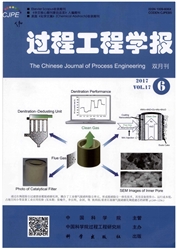

 中文摘要:
中文摘要:
为了增强酶的固定化效果,通过添加大分子试剂,在微波辐射作用下将木瓜蛋白酶固定在介孔泡沫硅的孔道中.结果表明,在加酶量为400mg/g时,微波辐射下木瓜蛋白酶与牛血清白蛋白(BSA)共固定化制得的固定化酶催化效果最好.当BSA含量为加酶量的5%(ω)时,固定化酶表观活力高达419.1U/mg,相对活力和酶活回收率分别为126.0%和119.1%.影响固定化酶活力的主要因素依次为加酶量、BSA含量、微波功率和固定化pH.该固定化酶的最适反应pH为7.0,最适反应温度为75℃,热稳定性优于游离酶和未加入BSA的固定化酶,80℃下热处理3h,剩余活力仍为初始活力的88.2%.
 英文摘要:
英文摘要:
To improve the immobilization of papain, papain was immobilized on the mesocellular siliceous foams (MCFs) by maeromolecular crowding under microwave irradiation. It was observed that the immobilized enzyme exhibited the highest catalysis activity when papain was co-immobilized on MCFs with bovine serum albumin (BSA) and the ratio of enzyme to support at 0.4(ω). The observed activity of dry immobilized enzyme was 419.1U/mg, the relative activity and activity yield of immobilized enzyme 126.0% and 119.1%, respectively, when the ratio of BSA to papain was 5%(ω). The main factors influencing the activity of immobilized enzyme were orderly the amount of papain, ratio of BSA to enzyme, power input of microwave and pH .The optimum pH and temperature of immobilized enzyme were 7.0 and 75℃, respectively. The co-assembled papain with BSA was more resistant to heat than free enzyme and the papain assembled solely in MCFs. Its residual activity was still maintained as 88.2% of the initial activity after heating at 80℃ for 3h.
 同期刊论文项目
同期刊论文项目
 同项目期刊论文
同项目期刊论文
 期刊信息
期刊信息
